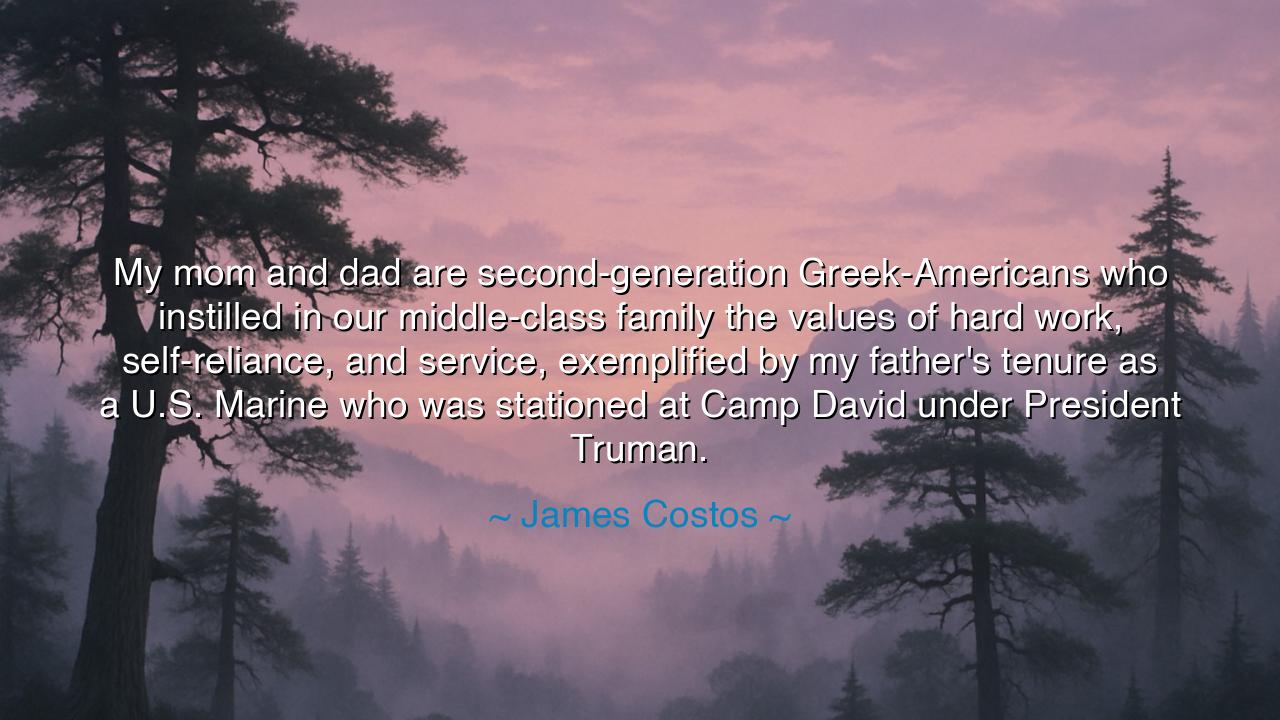
My mom and dad are second-generation Greek-Americans who
My mom and dad are second-generation Greek-Americans who instilled in our middle-class family the values of hard work, self-reliance, and service, exemplified by my father's tenure as a U.S. Marine who was stationed at Camp David under President Truman.






The words “My mom and dad are second-generation Greek-Americans who instilled in our middle-class family the values of hard work, self-reliance, and service, exemplified by my father's tenure as a U.S. Marine who was stationed at Camp David under President Truman” were spoken by James Costos, a diplomat and businessman whose life bridges two great traditions — the legacy of immigrant perseverance and the honor of service to one’s nation. Beneath these words lies a truth both ancient and enduring: that greatness is not born of privilege, but of virtue, of discipline, and of the sacred passing of values from one generation to the next. It is a story that begins not with glory, but with roots — the humble origins that give strength to the tree of destiny.
In this reflection, Costos honors not wealth or status, but heritage — the lineage of his Greek ancestors who came to America seeking freedom and possibility. The Greeks of old revered arete, the excellence of character that comes through effort and integrity. That same spirit lived on in the hearts of his parents, who, though children of immigrants, carried forward the timeless virtues of their forebears: to labor with dignity, to depend upon one’s own strength, and to give back to the community that made one’s life possible. These values, handed down quietly within a middle-class family, are the foundation upon which civilizations are built. For nations rise not through empires, but through homes where virtue is taught by example.
Costos’s words also exalt the power of service, embodied in his father’s time as a U.S. Marine, stationed at Camp David under President Harry S. Truman. There, amid the quiet woods where power and humility meet, his father lived the Marine’s creed — duty, honor, and country. This act of service was not merely a job, but a symbol of devotion — to something larger than oneself. In ancient times, such men would have been called guardians, protectors of the realm not for reward, but for honor. For the measure of a man is not found in what he owns, but in what he gives to others.
To speak of one’s parents as models of hard work, self-reliance, and service is to celebrate the trinity of virtues that sustain both individuals and nations. Hard work tempers the body and the will, self-reliance strengthens the mind, and service ennobles the spirit. Together, they form the foundation of what the ancients called civic virtue — the duty of every citizen to contribute to the harmony and strength of their community. In this way, Costos’s quote is not only personal; it is philosophical, echoing the wisdom of Aristotle and the Stoics, who taught that the good life is one lived in balance between individual effort and communal duty.
We may recall, too, the example of Leonidas of Sparta, whose courage at Thermopylae was not born in the heat of battle, but in the discipline of his upbringing — a life shaped by parents who taught that service to one’s people is the highest form of love. Likewise, the lessons instilled by Costos’s parents forged in him the quiet strength of the servant-leader: one who leads not through command, but through character. Their story reminds us that the soil of humble homes often produces the noblest spirits, for there the seeds of virtue are tended with care.
But there is something profoundly modern in his words as well. In an age where material wealth and status often overshadow moral worth, Costos reminds us that it is not where you begin, but how you live that defines you. His family, like countless others, carried the immigrant’s torch — the belief that one can rise not through shortcuts or inheritance, but through effort, discipline, and service. These are the ancient virtues reborn in modern form — the same virtues that built both the Parthenon and the Republic, that guided warriors, philosophers, and statesmen alike.
The lesson, then, is clear: to honor one’s roots is to understand the sacred lineage of values that brought you to where you stand. Every act of labor, every display of discipline, every moment of service echoes backward through generations, connecting us to those who came before. Be like Costos’s parents — work not only for success, but for excellence; depend not on comfort, but on courage; and serve not for reward, but for meaning. For in the quiet perseverance of ordinary people lies the extraordinary strength of nations.
Thus, remember this, children of tomorrow: heritage is not a chain, but a foundation. Build upon it with the stones of integrity and the mortar of gratitude. Let your life, like that of James Costos’s father, be a testament to the truth that honor is found not in titles or wealth, but in how faithfully we serve — our families, our communities, and the greater good. For when you live by hard work, self-reliance, and service, you become part of an unbroken chain stretching back to the ancients — a chain that binds not by blood alone, but by virtue, strength, and purpose eternal.






AAdministratorAdministrator
Welcome, honored guests. Please leave a comment, we will respond soon